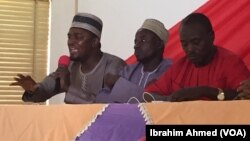With Boko Haram militants waging increasingly audacious attacks and political tensions skyrocketing ahead of the March 28 elections, fears are growing that Nigeria could see a repeat of the devastating 2011 election riots, activists told a VOA town hall Friday.
More than 800 people died in the weeks following the April 2011 election that pitted incumbent President Goodluck Jonathan against Muhammadu Buhari, a former military officer who ruled the West Africa powerhouse following a coup in the mid-1980s.
Buhari is challenging Jonathan once again this year, and last month’s decision by national election officials to postpone the vote has strained relations between the ruling party, the People's Democratic Party, and Buhari’s party organization, the All Progressives Congress.
Danjuma Bello Sarki, a youth leader involved with a PDP gubernatorial campaign in Kaduna State, north of the capital Abuja, told the town hall that politicians were to blame for stoking tensions, and potential electoral violence.
“I think if the politicians themselves would agree to act normally, according to the rules, then a lot of this severe crisis we have with the election would be diminished,” he told several dozen political activists.
The town hall took place in Kaduna, a city of roughly 2 million that saw some of the worst violence during the 2011 riots. About 70 people ranging in age from 18 to 35 attended the meeting, which was organized by VOA journalist Ibrahim Ahmed.
“Let them not bring their religious differences into politics. They should allow people to elect people based on the qualities … they possess and the promises to deliver to the people,” Sarki said.
Umar Yahaya, who heads APC youth campaign effort in Kaduna, said the 2011 election was marred by flawed vote counting procedures that resulted in some ballots being tampered with and results being skewed.
Protests that year by Buhari’s supporters snowballed into violent riots and sectarian killings in many northern states, including Kaduna state. Jonathan is a Christian from Nigeria’s oil-rich south; Burhari is a Muslim, whose support base is mainly in the north.
Still, Yahaya praised the work this year by the Independent National Electoral Commission, and predicted the March 28 vote would be more efficient and transparent.
As Africa’s most populous state, one of the continent’s largest economies and a major exporter of oil to the United States elsewhere, Nigeria’s stability is considered crucial not only for West Africa but for a much wider geographic region.
Rampant corruption, however, has hamstrung its development, along with the persistent grumbling by the largely Muslim north that the country’s vast oil wealth has only benefited the mainly Christian south.
Boko Haram’s origins are rooted in an effort to fight that corruption, before it evolved a murderous, fundamentalist group.
VOA's Hausa Service plans another live town hall meeting broadcast in mid-March from Nigeria's largest city, Lagos.




